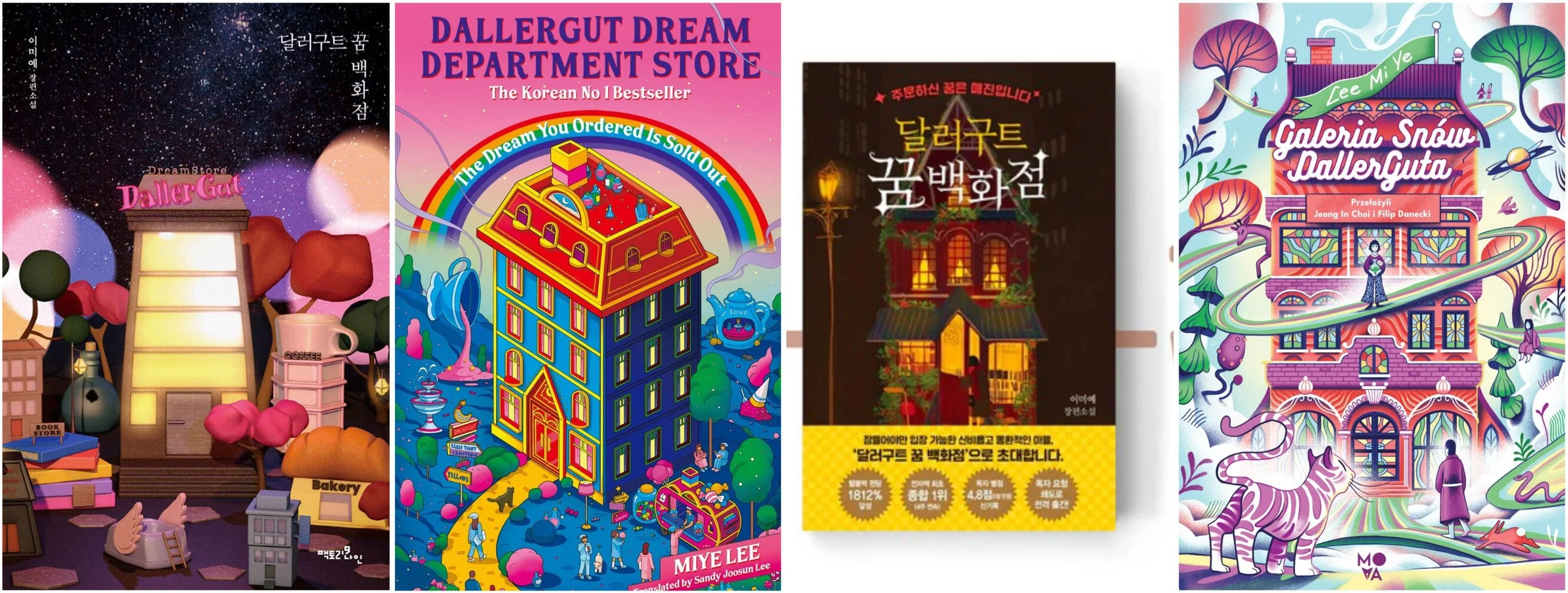The Dallergut Dream Department Store Lee Mi-ye
I read this book in Polish.
I got it for my birthday — and let’s just say... my age now comes with a side of post-midlife crisis awareness. 😉
And I think there was a reason it came to me now.
At first glance, I thought — judging by the soft, pastel cover — that it would be a warm and gentle story. Something cozy. But there’s much more depth hidden inside. It’s a book about life. And about remembering to be mindful in the chaos of it.
“Dlaczego ludzie śpią i śnią? Odpowiedź brzmi: ponieważ każdy jest niedoskonały i głupi na swój sposób. Niektórzy są jak Pierwszy Uczeń i cały czas patrzą przed siebie, a inni tkwią w przeszłości jak Drugi Uczeń. Ale każdemu z nas łatwo jest stracić z oczu to, co naprawdę ważne. (...) Jak nasze wczorajsze zmartwienia znikają po dobrze przespanej nocy i jesteśmy w pełni sił, aby stawić czoła dzisiejszemu dniu? Tak właśnie jest!”
“Why do people sleep and dream? The answer is: because everyone is imperfect and foolish in their own way. Some are like the First Student, always looking ahead, while others are stuck in the past like the Second Student. But all of us easily lose sight of what truly matters. (...) Like how yesterday’s worries vanish after a good night’s sleep, and we’re full of strength to face the day? That’s exactly how it works!”
Some chapters resonated more than others — but one in particular stayed with me.
I have a dear friend who always seems unhappy. Nothing ever feels like enough. I wish this person could experience what the character in one story does — a man with an “average” life who keeps chasing something “better.” He ends up drinking a dream where he lives someone else’s life… and wakes up with a deeper sense of gratitude for his own.
“Zaakceptowanie swojego życia takim, jakie jest, i bycie za nie wdzięcznym. Łatwiej powiedzieć niż zrobić. Ale jeśli jesteś w stanie tego dokonać, wierzę, że pomoże ci to uświadomić sobie, że szczęście było tuż za rogiem.”
“Accepting your life as it is and being grateful for it. Easier said than done. But if you manage it, I believe it will help you realize that happiness was just around the corner all along.”
I wish more people could pause and see what they do have.
Someone might have all the money in the world — but feel lonely.
Someone else might be eating instant noodles alone, far from home — but living their dream as a stage performer. Like the last showgirl.
Life isn’t about comparing. It’s about noticing. Choosing. Responding.
“Jeśli spojrzą państwo na to z perspektywy, najtrudniejsze chwile w państwa życiu to także te, w których staraliście się jak najlepiej pokonywać trudności. Teraz, gdy już przez nie przeszliście, wszystko zależy od tego, jak je postrzegacie. Czy nie jest to świadectwo państwa siły, że nadal żyjecie i macie się dobrze po tylu latach?”
“If you look at it from a distance, the hardest moments in your life were also the ones where you did your best to overcome difficulties. Now that you’ve survived them, everything depends on how you view them. Isn’t it a testament to your strength that you’re still here — alive and well after all those years?”
One of the dreams in the book touches on overcoming trauma.
In my case? It’s always the final school exam that haunts my dreams. But now that I’m older, I sometimes laugh in the dream — sitting at the exam table, holding the test like it’s life-or-death… and thinking, please. Nothing is riding on this anymore.
And I know it. Because I’ve lived through it.
In those moments, what helps me the most is something Dale Carnegie once wrote:
Whenever I’m stuck in a worst-case scenario, I ask myself: What’s the absolute worst that could happen? Then I accept it. Make a mental plan. Figure out how I’d live with it. And somehow, I find peace. ❤️
But I want to leave you with a different quote — one about inspiration:
“Inspiracja” to wygodne słowo. Sprawia, że człowiek czuje się tak, jakby coś wielkiego powstało z niczego, prawda? Ale w rzeczywistości świetny pomysł zależy od tego, jak długo spędzi się nad nim w trudzie, i to właśnie robi różnicę: czy poświęciło się wystarczająco dużo czasu, szukając odpowiedzi, czy nie. To jest klucz. Pan po prostu utknął i umęczył się, aż znalazł odpowiedź.”
“‘Inspiration’ is a convenient word. It makes you feel like something great came out of nowhere, right? But in reality, a great idea depends on how long you’re willing to struggle for it. That’s what makes the difference: whether or not you gave it enough time to search for the answer. That’s the key. You just got stuck and wrestled with it — until you found your way out.”
So let’s wrestle. Let’s create. Let’s dare to live our lives fully, not someone else’s.
Let’s dream. Try. Fail. Heal. Repeat.
And find what gives us freedom.
“Cokolwiek was ogranicza... czy to miejsce, czas, czy wada fizyczna (…) proszę, nie skupiajcie się na tych rzeczach. Zamiast tego skoncentrujcie się na znalezieniu czegoś, co przyniesie wam wolność.”
“Whatever limits you — be it place, time, or physical condition (…) please, don’t focus on those things. Instead, concentrate on finding something that brings you freedom.”
